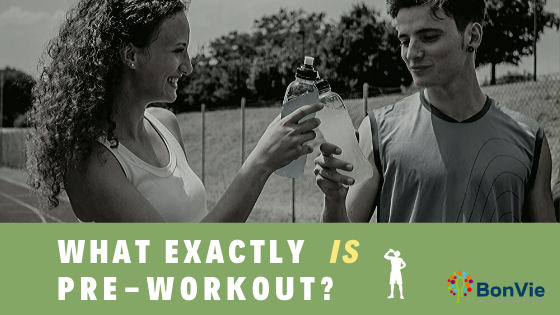
08 Nov What is a Pre-Workout Drink?
Pre-workout is a powder drink mix that is supposed to boost your power to enhance your workout performance. These supplements are recommended to be consumed about 15-20 minutes prior to your workout, but directions vary depending on the brand and pre-workout type.
Pre-workout drinks vary brand, but are usually marketed to either amp someone up with high amounts of caffeine (more ideal for cardio) or to amp someone up with more “pump” for a weight lifting sessions. Pump formulas contain vasodilators that increase nitric oxide levels in your blood, leading to an increase of blood flow to your muscles; they rarely contain caffeine. Some brands combine these two different products into one. These all-in-one pre-workout blends usually contain both the common pre-workout ingredients (such as caffeine and creatine) as well as the pump ingredients (vasodilators).
Most importantly, safety should always come first and pre-workout supplements are NOT regulated or monitored by the FDA. Proceed carefully if you choose to consume them and don’t think that label claims are true, since they may be nothing more than marketing gimmicks.
Not all pre-workouts are bad though, since there are proven ingredients in pre-workouts that may help you increase your endurance, power, and performance in the gym. How do you choose?
1) Look at the ingredients and doses of each ingredient on the label to make sure you recognize the ingredients and know that they are safe for you. The fewer ingredients, the better.
2) Avoid creatine, which is a common ingredient in many pre-workout drinks. Creatine has been shown to lead to GI problems, headaches, kidney damage, anxiety, irritability, aggression, nervousness, sleepiness, depression, abnormal heart rhythm, fainting or dizziness, blood clots in the legs (deep vein thrombosis), seizure, swollen limbs, and other health issues. You feel me here? We don’t want to be loading up on this stuff day in and day out!
3) Avoid “proprietary blends” which fail to list the exact amount of each ingredient.
4) If you’re caffeine sensitive, avoid pre-workout drinks that are targeted at “increasing your energy”, since that’s typically code for high doses of caffeine. See my blog on caffeine to help you determine whether some of the side effects that you might be experiencing from your pre-workout might just be from caffeine overload.
5) Check whether the supplement has been tested by an independent laboratory such as informed-choice.org and the Banned Substance Control Group. Many supplements will have labels on them indicating whether they have been independently tested for quality and safety. Note that just because it has been tested, it doesn’t mean that you should take it or that it will enhance your performance. However, you can be sure that the drink contains the amounts of ingredients listed on the label.
Choosing a pre-workout is a personal choice. I choose not to drink them, instead opting for water that I’ll sometimes enhance with natural electrolytes or with a prebiotic powder for flavor. If you want to try pre-workouts, just be thoughtful and listen to your body to see how you feel. Some folks feel jittery from them, while others feel great. Just like no two pre-workout drinks are alike, no two bodies are the same. Do what feels good for you!


No Comments